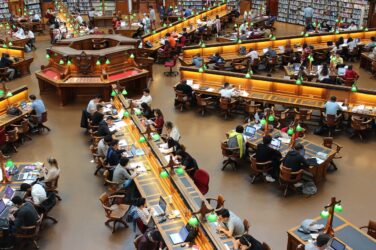Normally, E&M contributor Dóra Hegedüs writes about current events. But there are few things ‘normal’ about 2020. Reflecting on the last twelve months, she ponders the power of social capital and the joys of coming across a Hungarian YouTube video on mutual aid (really). At the end of this difficult year, Dóra tries to find a gleam of hope, moments of empathy, and a source of consolation for all those who are also reeling from the past months.
2020, or at least the first half of it, until September, was supposed to be my gap year, to reconnect with friends, family and last but not least myself, after seven long years spent in London. As much as I have managed to build new friendships there, London is a place where people come and go and never settle. Due to this extreme level of fluctuation, I have experienced isolation and loneliness every now and then, and I always longed to return where my robust safety net, my basic social capital is: to my hometown, Budapest. (Note: perhaps me being an absolute introvert, who prefers stability and staying in her own little cocoon did not help either).
The riches of social capital
Social capital is perhaps the most important term coined in modern Political Science by an American heavyweight in the field: Robert D. Putnam. According to him, social capital stems from the aggregate ‘features of social organizations, such as networks, norms and trust that facilitate action and interpersonal cooperation for mutual benefit’. To list some practical examples, the following can be sources of social capital: your family, your group of old high school or uni mates, your weekend photo meet-up group, your football team or yoga pals, the local church that you attend, the neighbour assembly of your area, as well as your close colleagues at work. Social capital can be anything that provides you with a feeling of belongingness and reciprocal fulfilment, happiness. Furthermore, social capital serves usually as a first line of defence, which will prompt a bottom-up, grassroot action if something goes wrong, and if authorities cannot respond properly. Finally, social capital is also about mutual attentiveness, something that can offer you a cushion to fall back on when you are in a downward spiral; in other words, it is a guarantee that none of the group members will be left behind.
The cost of social distancing
Unfortunately, the current crisis situation with the imperative of keeping distance, preventing gatherings, and forbidding social contact targeted exactly this quintessential, first line of defence, what I described above as social capital. Over the past year, I have barely had any physical contact with my friends, and I don’t know the day when I last gave a hug to my grandparents. Regardless of all the complications, I feel extremely privileged for having an extended network of social capital and not losing anyone to the virus so far. Recently, I have been trying to raise awareness of charities supporting homeless youngsters and kids growing up in care, who are increasingly prone to be impacted by COVID-19, and who have to make it through the pandemic without any social capital whatsoever. Surely my little campaign did not reach the Hungarian government; before Christmas, Parliament passed a piece of legislation banning single parents and same sex couples from adopting kids, denying kids a second chance of having a safety net and a loving family, under the aegis of the emergency situation.
At the beginning of the year, something unprecedented happened: I whole-heartedly hoped that Donald Trump was right.
Other, less abominable examples of government action or rather inaction were abundant in number, showcasing the inability of institutions to break the status quo and act rapidly. This has been my greatest fear at the outbreak of the virus: that our economies, governments, social and welfare systems soaked in neo-liberalism, profit-orientation and in the logic of “keeping the government balance sheet neat” are incapable of dealing with a global crisis. At the beginning of the year, something unprecedented happened: I whole-heartedly hoped that Donald Trump was right, and the crisis was an unserious matter, inflated by media hysteria. There must be a first time for everything – thought silly me ironically, but then all my giggles quietened down and turned into clinical depression, when the Italian lockdown, the first in Europe, was introduced back in March. It finally dawned on me that people were going to lose their lives not only to the virus, but also to the surging economic crisis against the backdrop of the pandemic. My family, friends, and partner, who all know me as a person with a usually cheerful demeanour didn’t recognise me. Nothing made sense, not even the funded PhD offers that I received, beckoning me with the opportunity that I can finally do what I always wanted in life: social and political research. I was feeling extremely down and helpless, thinking I wanted to do something meaningful that supports people in need.
Mutual aid and other reasons to be hopeful
Then, on my favourite YouTube channel, I encountered a wonderful video titled (mirror translation from Hungarian): In a crisis, mutual aid grows out of the ground, which simply refers to mutual assistance emerging out of nowhere in a moment of crisis. The video (unfortunately available only in Hungarian) discusses an award-winning book: A Paradise Built in Hell by Rebecca Solnit, who is an expert in crisis sociology. She presents vivid descriptions of some landmark crisis situations in the US: the 1906 San Francisco earthquake, Hurricane Katrina, 9/11 …etc. The book essentially speaks to Robert Putnam’s concept of social capital and interpersonal cooperation, although built much more on the ad-hoc, ephemeral basis of instant solidarity, empathy, and a desire to help, instead of kinship, personal connections, shared identity, or shared hobbies. The first ones to run inside burning edifices in San Francisco or the shaky twin towers in New York were ordinary passers-by and everyday civilians, before official rescue teams arrived. Similar acts of solidarity emerged during the pandemic, when the welfare systems of European countries could not respond rapidly enough, and our reference network, our ordinary social capital was not there to assist either due to the draconian (and necessary) lockdown measures. I guess I don’t need to list specific examples, we are all aware of the ‘balcony singing’, ‘virtual restaurant table booking’, and ‘neighbourhood shopping for the elderly’ initiatives.
If people perceive something as a crisis, they are naturally wired to help.
When I finished watching the video, I concluded that, after all, I am not insane. I just had a very human reaction to a crisis, which is absolutely normal. In the end, human beings are not the utility-maximiser, individualistic, self-serving creatures they are conceived to be by behavioural economists and game theorists. Perhaps if we could discover how to trigger and exploit this fantastic characteristic, combining solidarity and compassion that people showcase when dealing with a crisis, the conventional crisis-aversion techniques in place would be different, more effective, and much more successful. Perhaps our other nemesis, climate change, could be tackled much better at the micro, local level, too. My redemption has also become getting involved in a bunch of activities helping the community I live in, which not only assisted me with overcoming depression, but I also consider these my greatest achievements in 2020. Of course, climate change and the COVID-19 pandemic are different from the crisis situations analysed by Solnit. Coordination and cooperation at institutional level is indispensable to tackle these mammoth-scale problems, and I deeply condone some never-seen-before institutional responses like the EU’s Next Generation fund. Instead, what I’m trying to convey is the following: if people perceive something as a crisis, they are naturally wired to help, and to set up local initiatives without any instructions from a higher authority. Where the threshold lies to define something as an urgent crisis or not, and what triggers this natural response is a mystery to be urgently resolved.
Cover photo: Charles Deluvio (Unsplash), Unsplash licence










